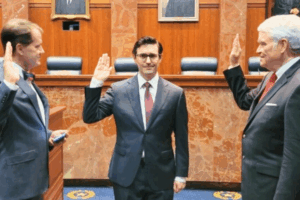Cooperation is a dirty word in American politics nowadays. For all kinds of political hot-button issues, opposing sides line up and shout at each other rather than trying to find some common ground to seek meaningful solutions.
Nowhere is that spirit of polarization more evident than in the current political debate about firearms regulation.
On one side are media images of people carrying semiautomatic combat rifles in public places. Dozens of states either allow open carry or firearms on a college campus, including Texas where the Legislature passed a “campus carry” bill that will allow firearms almost everywhere on public university campuses, despite the objections of campus safety experts and the chancellor of the University of Texas System, who also happens to be a retired admiral.
On the other side are proponents of stiffer firearms regulations who want to reduce the number of guns in public places, to stiffen the rules around background checks for people wanting to purchase firearms, and to regulate some of the design characteristics of firearms that would be available for public sale. This side exploits tragedies involving firearms to gain emotional leverage.
The two sides of this debate tend to demonize each other rather than finding common ground.
And all the while, politicians are forced to choose sides. Either they get good grades from the National Rifle Association for not passing any firearms-related laws, or they get a failing grade and the NRA works to ensure that they will not be re-elected. This side uses the fear of firearms confiscation as an emotional tool.
Passing effective firearms legislation seems impossible in this environment.
And that is why we are writing this article. The current political climate suggests that we should never attempt to write an article together. One of us is a concealed handgun licensed holder and former owner of a weapons manufacturing facility, and the other favors stricter regulation. There are a number of issues that we disagree about, but even so, we are united in wanting to reduce firearms-related deaths.
Both of us oppose the push for open carry legislation across the country. When firearms are carried openly in public places, it creates an environment of intimidation and fear rather than one of openness and mutual respect.
Additionally, by carrying weapons openly, the opportunity for theft of the firearm or a murder to obtain the firearm are increased dramatically.
Both of us also agree that there should be universal instant background checks for anyone purchasing a firearm in any setting. There are unobtrusive methods to minimize the number of firearms that are sold to known criminals and those with a history of mental-health problems.
We are both likewise concerned about the implementation of campus carry legislation in Texas. The minds of young men and women on college campuses are still developing. They do not always make the best decisions, as anyone looking back on their late teens and 20s can attest.
College is a time when students experiment with drugs, alcohol and sex. Emotions are high, competition is intense and bullying is present. Adding loaded firearms to that mix is not responsible and certainly does not advance the education process.
College students are also learning to cope with failure. Increasing the availability of loaded firearms can make it easier for students who are temporarily upset about their grades or their relationships to cause harm to themselves or others out of impulse or depression.
That does not mean an armed response to an active shooter is inappropriate. The sooner an active shooter is engaged, the better. But it is up to the college administration to fill that security need with armed and properly trained personnel.
We offer this article as a plea. Regardless of whether you own a firearm, it is important to take a stand against laws that do not promote safe and sensible firearms ownership. After all, most firearms owners want effective but nonintrusive, firearms laws.
Unless we take it upon ourselves to work together even when we disagree, the political process will be dominated by powerful lobbying groups that do not speak for either side.
Art Markman is a cognitive psychologist and director of the Human Dimensions of Organization program at The University of Texas at Austin. Mike Miller owns AceCustom Engraving in Round Rock and previously owned Calico Weapons in Bakersfield, California.
A version of this op-ed appeared in the Houston Chronicle and Corpus Christi Caller Times.
To view more op-eds from Texas Perspectives, click here.
Like us on Facebook.



